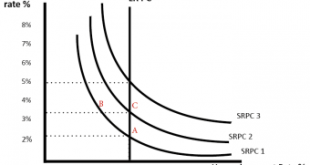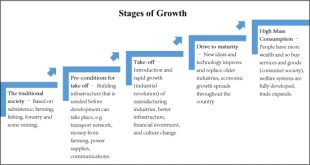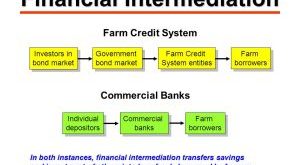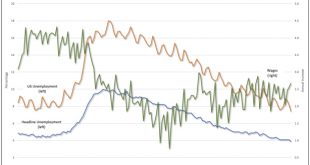from David Ruccio The usual suspects have attacked Bernie Sanders’s proposal for the federal government to guarantee a job paying $15 an hour and health-care benefits to every American worker “who wants or needs one.” According to Robert J. Samuelson, “The proposal would add to already swollen federal budget deficits. . .Then there’s inflation. The extra spending and higher wages might push prices upward.” After listing a number of other “unavoidable” problems, Samuelson concludes:...
Read More »The return of the oil threat
from C. P. Chandrasekhar On the morning of April 24, the price of Brent crude, the global benchmark for oil prices, rose above $75 a barrel, touching its highest level since 2014 and signalling the return of an era of high oil prices. That is a $30 per barrel or 66 per cent rise from the previous low of around 10 months ago. As expected, this has made oil importers nervous. But, despite the benefits it would bring US shale producers, even President Donald Trump is rattled. In one more of...
Read More »Busting the NAIRU myth
from Lars Syll Even as it became conventional wisdom, the supposed relationship between unemployment and increasing or decreasing rates of inflation was breaking down — notably in the 1990s. Unemployment got below 4 percent in 2000 without inflation taking off. Since the onset of Great Recession, the gap between theory and reality has only grown … Once we see how weak the foundations for the natural rate of unemployment are, other arguments for pursuing rates of unemployment economists...
Read More »Krugman on Drugs
from Dean Baker I was glad to see Paul’s short post explaining some of the economics of the U.S. government negotiating drug prices with the drug companies; the route Donald Trump rejected. I thought I would add a few more points. First, the monopoly profits earned by the drug companies provide a powerful incentive for rent-seeking. This is the standard story that economists always complain about with trade protection, except instead of talking about a tariff that raises the price of the...
Read More »Utopia and economic development
from David Ruccio From the very beginning, the area of mainstream economics devoted to Third World development has been imbued with a utopian impulse. The basic idea has been that traditional societies need to be transformed in order to pass through the various stages of growth and, if successful, they will eventually climb the ladder of progress and achieve modern economic and social development. Perhaps the most famous theory of the stages of growth was elaborated by Walt Whitman...
Read More »On the vital importance of understanding international financial architecture
from Asad Zaman Part 1: Power/Knowledge – How Macro Theory is shaped by the Powerful Why Understand Macro? If we understood macroeconomics, we would be able to understand the reasons for the major economic events currently going on all around us. For instance, increasing inequality, effects of austerity, Brexit, inequities of post-Bretton Woods dollar based financial system, impacts of emerging economy of China on global finance, and many other questions of vital importance for conduct of...
Read More »Textbooks — peddling lies about money and finance
from Lars Syll A couple of years ago — in a debatewith James Galbraith and Willem Buiter — Paul Krugman made it perfectly clear that he was a strong believer of the ‘loanable funds’ theory. Unfortunately, this is not an exception among ‘New Keynesian’ economists. Neglecting anything resembling a real-world finance system, Greg Mankiw — in his intermediate textbook Macroeconomics — more or less equates finance to the neoclassical thought-construction of a ‘market for loanable funds.’ On...
Read More »WEA Commentaries – new issue
Download the issue as a PDF In this issueGame Theory—A Severe Case of ‘as-if’ Model Platonism Lars SyllUtopia and Macroeconomics David RuccioA Better Way for Development Theory and Practice Habtamu Girma DemiessieOn Kurien’s new book, Economics of Real-Life Stuart BirksEconomics Education and Pedagogy Malgorzata Dereniowska interviews Peter Söderbaum Announcements and WEA contact details Please support the WEA by paying a membership fee or making a small donation....
Read More »Debunking the NAIRU hoax
from Lars Syll In our extended NAIRU model, labor productivity growth is included in the wage bargaining process … The logical consequence of this broadening of the theoretical canvas has been that the NAIRU becomes endogenous itself and ceases to be an attractor — Milton Friedman’s natural, stable and timeless equilibrium point from which the system cannot permanently deviate. In our model, a deviation from the initial equilibrium affects not only wages and prices (keeping the rest of...
Read More »Their beautiful recovery
from David Ruccio Does anyone really need any additional evidence of the lopsided nature of the current recovery? Employers certainly don’t. They’re managing to hire additional workers, thus lowering the unemployment rate. But they don’t have to pay the workers they hire much more than they were getting before, with wages barely staying ahead of the rate of inflation. As a result, corporate profits continue to grow. Clearly, what we’re seeing remains a one-sided recovery: employers are...
Read More » Real-World Economics Review
Real-World Economics Review







